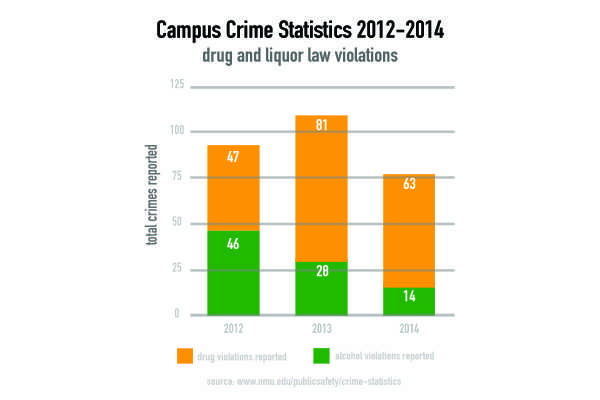At NMU, a sudden increase in the use of a drug thought to be acid, which was causing violent reactions in the users, put Public Safety on alert, but officials say it’s not turning into a long-term problem.
According to Public Safety Det. Guy LaPlante, who headed investigations into use of the drug, 12 students were involved in taking a drug they identified as LSD, or acid. Their violent reactions prompted Public Safety to send out an email urging students to be cautious in what they consume.
“The purpose of the memo was to alert the campus community that there was a substance that was being called LSD or acid that was causing an adverse reaction,” Mike Bath, director of Public Safety, said.
Bath said instead of having the psychedelic effects that are associated with the drug, the students turned violent and uncontrollable and often needed to be hospitalized. Most of the time, students did not have any recollection of their actions once the drug wore off.
“We don’t really deal with that type of drug here, or at least we haven’t in recent years. It’s usually alcohol, marijuana or prescription pills. The officers have seen those and understand how they work,” LaPlante said. “This is new now because we don’t see it.”
Because no acid was ever discovered by Public Safety during their searches, they are unable to confirm that the drug the students ingested was acid in its usual form. What LaPlante thinks is more likely is that it was a chemically manufactured version of LSD that did not have the intended effects. Because of the students identification of the drug as acid and having taken it in blotter paper form, Public Safety has concluded that it was some form of action LSD.
“But as it turns out, there are other things you can put on paper,” Laplante said. “It would be more like a synthetic drug which would be conducive to the violent reactions they’ve been having.”
Most of the instances of the acid consumption took place over Labor Day weekend, LaPlante said.
“Then there was a break in the action, and once they started picking up again, it became a health and safety issue which prompted the email,” LaPlante said.
LaPlante believes that the email was productive, informing students about the risks of taking a drug that has had adverse reactions around campus.
“It came to a plateau around the end of October to November. Knock on wood, we haven’t had any concerns of it since,” LaPlante said.
LaPlante believes that the use of this acid was contained to campus, since there have not been reports of violent reactions in the community.
“Whatever it was seems to have disappeared, which is a good thing,” LaPlante said.
Bath and LaPlante agree that it was not a common occurrence to have this kind of hard drug on campus. The most common drug use on NMU’s campus is alcohol, marijuana and prescription drugs. Prescription drugs are easy for students to get and are everywhere, LaPlante said. The trend over the last decade is the increased marijuana infractions and decreased alcohol infractions.
According to Public Safety, 63 drug law infractions and 18 alcohol law infractions were reported in 2014. These numbers and the ones from the last three years are average and consistent, LaPlante said.
The use of any type of drug on campus, including LSD, can have serious ramifications for students. The consequences can be anywhere from being suspended or put on academic probation, to facing fines and jail time.
If a student believes someone has overdosed or is having an adverse reaction to a substance they have taken, they are urged to call 911 immediately, LaPlante said.



























